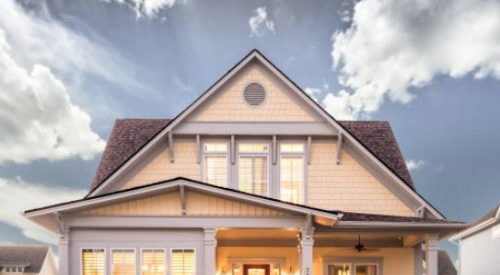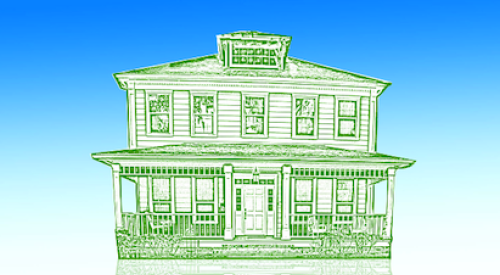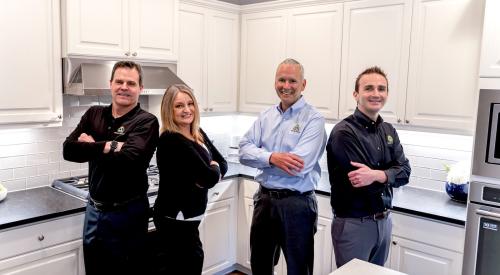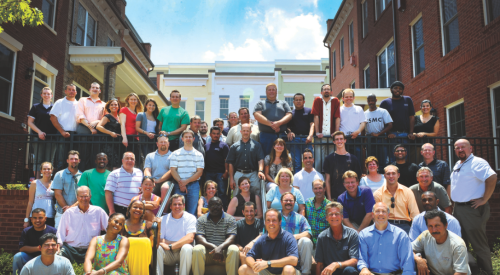Corporate Profile: Ideal Homes is a Norman, Okla.-based builder serving the Oklahoma City metro area with 16 communities for first-time and move-up buyers. Ideal Homes had revenues of $57 million in 2005, closing 435 homes. The company is Oklahoma's largest home builder, and operates an in-house mortgage company which handles an average of 60 percent of the company's closing.
Mission: Ideal Homes' mission is to offer quality, affordable homes, today and tomorrow, based on the vision of building the American dream through mutually beneficial relationships with customers, contractors and co-workers.
Ideal Homes values quality in building the best performing homes through its people and processes. It holds integrity in being honest, reliable and accountable and promotes leadership for inspiring higher performance from others through its actions.
Management Team: Gene McKown, co-owner, president of development; Vernon McKown, co-owner, president of sales; Todd Booze, co-owner, president of construction; Millie Eubanks, vice president of sales; JaRee Stambeck, chief financial officer; Russ Gammill, director of purchasing; Brian Rice, director of operations.
Strategic Goals: The company approaches management as a process that requires continuous improvement. Ideal Homes centers its strategic goals through a number of “key result areas” including, but not limited to:
- Innovation and marketing leadership through research, customer feedback on products
- Improving communication processes and systems
- Customer satisfaction with the goal of having 95 percent or more of customers willing to refer
- Employee training
- Community outreach
For 2005, Ideal set a number of ambitious one-year goals which included increasing revenues to $57 million, increasing gross margins, number of actual home sales, closing and traffic to model homes. Long-term goals include steady increases in many of these areas. Notably, by 2007, Ideal Homes plans to open a second operation in another market.
Judge's Comments: “The company's people and culture are the strongest areas of Ideal Homes. The company has positively influenced the entire Oklahoma City/Norman building industry. Ideal has chosen to run their business by 'doing the right thing' to drive results.”
Best Practices: Construction Quality
Well-built homes are the core of any builder's reputation. Ideal Homes enjoys a national reputation for energy-efficient homes. It tracks building statistics on a monthly basis and compares outcomes to its competitors.
Ideal Home's rigorous construction-quality processes include:
Contractor management: Agreements with contractors detail the scope of work for each completion stage. Ideal associates frequently meet in the field with contractors and train crews to expectation. New practices and procedures continually flow from these meetings.
Inspections: Ideal inspects every job performed by contractors for its complete scope of work. If the job is satisfactory, the Ideal superintendent releases the job to the next contractor and pays the purchase order. In addition to weekly inspections of every home by production managers, a detailed pre-drywall inspection is performed.
Smart House Energy Consultants, a third-party inspector, verify insulation, mechanical equipment and flashing on every home. The third-party inspections ensure Ideal's standards are met along with those in the national Engineered for Life (EfL) program. Plus, one in six Ideal homes are randomly selected by Smart House for a final inspection to ensure the tightness of the house envelope and the duct system via blower blower-door tests.
Trade Steering Committee: Ideal meets with its major trade contractors on a quarterly basis. One outgrowth has been a trade evaluation form used on every job to collect data on a weekly basis. Contractors and Ideal superintendents use the data to identify trouble areas and assist with project planning on future jobs.
Energy efficient: Ideal is a leader in energy-efficient homes. In 1997, the EPA recognized Ideal as the first “5 Star” energy-value rated building in the United States for entry-level homes under $150,000. In 2005, Ideal Homes built the nation's first Zero Energy Home under $200,000, featuring a solar cell energy system, ground-source heat pumps for heating and cooling and tankless hot water systems which conserve energy.
Ideal applies its energy-efficient learning into all its homes by applying emerging technologies. Years ago, Ideal was the first builder in its region to use environmentally friendly “low-e” vinyl windows. Ideal now builds all its homes with fresh-air ventilation systems which is critical because its homes are built tight with about five percent energy leakage compared to industry averages on new homes at 25 percent to 30 percent leakage.
Best Practices: Human Resources
Hiring Practices and Profit-Sharing Plan
Ideal Homes goes to great lengths to hire right and then keeps employees with an attractive profit sharing plan.
Ideal founders and management believe the key to building a superior company lies in recruiting and retaining exceptional personnel. Ideal customized its own extensive interviewing and hiring processes based on the book Topgrading, by Bradford Smart.
Ideal's practices include:
- Pre-screening phone interviews with all candidates
- Work history interviews, often two to three hours in length
- Detailed reference checks of each potential candidate
- Once candidates are pared to a leading few, they participate in individual one-hour interviews with each of four company executives
- Executives then meet to made a group decision on the best candidate for the job
After six months of employment, every employee participates in Ideal's profit-sharing plan at the same rate. Funds are paid each quarter based on two qualifying factors:
- Net profits of five percent or more
- Customer satisfaction surveys, conducted quarterly, must meet the company's yearly benchmark.












